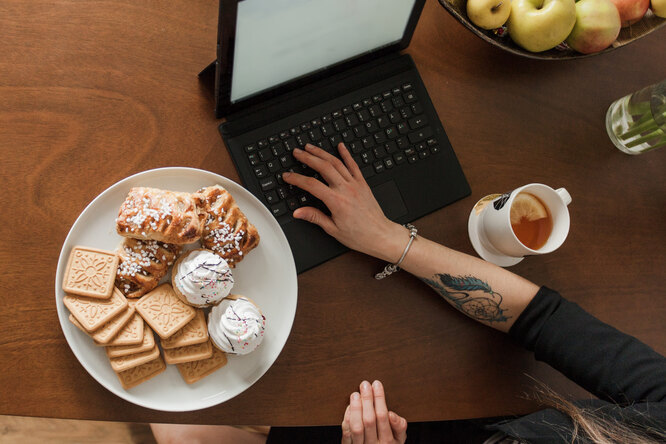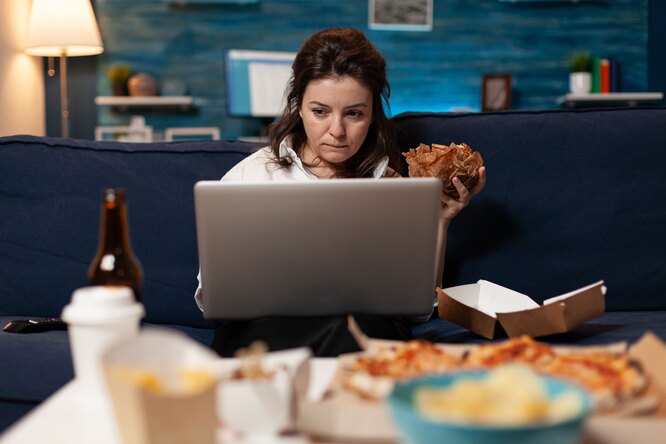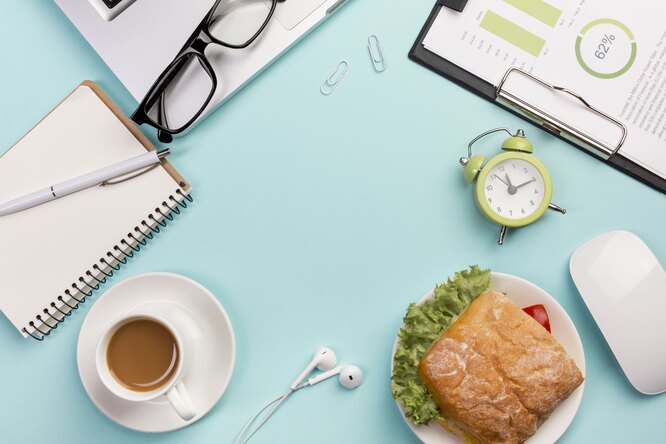Research shows that weight gain is common in competitive corporate environments. Comfort and unhealthy foods often become the only easy and convenient option for workaholics who put their interest in their career ahead of their health.

Diet with a sedentary lifestyle or eating patterns of workaholics
Workaholics often fall into the food trap, due to lack of time to prepare healthy meals or lack of a regular eating schedule at work. Therefore, these patterns are quite common:
- Eat convenience foods, fast food, food from vending machines, or use food delivery because you don’t have time to cook at home.
- It doesn’t matter what it is.
- Eat at your workplace.
- Skipping meals because you are too busy with work.
- Doesn’t eat with family or friends.
- When he eats, he doesn’t notice what he’s eating.
- Rely on coffee or other sources of caffeine to get through the day.
- Use alcohol to unwind at the end of the day.

How does workaholism affect weight?
A lot of work will seriously affect your weight. If you are always working or thinking about working, then you will always be too busy to do the things that will help you lose weight, such as working on your habits and mindset, cooking and choosing healthy foods, and moving regularly. You’ll end up skipping workouts more and more often and reaching for any quick, affordable meal just to eat and fill your stomach. These are usually processed snacks or fast foods that you can easily get. Workaholics always don’t have time for proper nutrition.
A large amount of work also affects other areas that make it impossible to lose weight:
- To bed
- For stress
- For alcohol consumption
Basic principles of diet at work for workaholics
These principles may not suit all workaholics, but they work quite well.

First Principle: Make a Commitment
It is impossible to lose weight without making a personal commitment.
For some workaholics, the thought of changing routines or adding yet another “to do” to an overly busy schedule may initially seem painful, but it is a mental hurdle that must be overcome.
If you are a workaholic, at some point in your life you have made a commitment to sacrifice other activities for the sake of your career. You made a conscious choice. The same willpower must be applied here. The process of losing weight begins with a decisive and uncompromising decision to change your lifestyle.
If you are not ready to commit to losing weight, then you are not ready to commit to weight loss and need to think about why it is not a priority.

Principle Two: Developing a Practical Diet Plan
Developing a practical diet plan and integrating that plan into a workaholic’s regimen is critical.

But your meals need to be tied not so much to a schedule, but to your fluctuations in feelings of hunger and satiety. First, focus on these signals, and then coordinate them with your schedule.
Principle Three: Exercise as part of your routine
It’s not easy to find motivation to exercise when you’re mentally exhausted. Your goal is to introduce exercise into a routine that will make you feel lighter and more energized. It’s best to do what you enjoy so you don’t give up on your workouts and have fun.

Fourth principle: Creating internal competition
This principle goes hand in hand with the first one — making commitments. No one can motivate a workaholic more than his inner voice. One thing that enterprise ecosystems have in common is competition. Self-motivation is a powerful tool that creates internal competition, forcing yourself to “improve.”
Career people can see a “long-term” goal that can be achieved through dedication and hard work. Losing weight is the result of a long journey.
Losing weight starts with habits and mindset. These principles may resonate with you, but if you are an “experienced” workaholic, then you may need deeper and more thorough work with a specialist.
Diet at work: menu option for the week
Making the right food choices for your work diet can have a significant impact on your energy and productivity. Protein-rich snacks such as nuts, seeds, low-fat cottage cheese or Greek yogurt keep your blood sugar levels stable and help keep you full for a long time. And fresh fruits and vegetables, such as apples, bananas, carrots or celery, are rich in vitamins and minerals and are an excellent snack option.
However, we should not forget about whole grains and proteins. Sandwiches or sandwiches on whole grain bread with meat or vegetables will provide you with energy for a long time and provide many useful substances. Home-cooked chicken, turkey, tuna, or eggs are easy to take with you to ensure you’re hydrated at work and pair well with vegetables and whole grains.
Diet during a sedentary job often becomes a challenge for many people. Luckily, there are many healthy options you can take with you to work. Here is an example of a menu for the week (Monday to Friday), taking into account the average calorie content of 1500–1700 kcal per day.
- Monday:
Breakfast: Smoothie made from banana, strawberries, buckwheat and low-fat yogurt (about 300 kcal)
Snack: Apple (about 95 kcal)
Dinner: Whole grain bread with avocado and turkey (about 350 kcal)
Snack: Almonds (about 160 kcal)
Dinner: Chicken breast with steamed vegetables (about 350 kcal)
- Tuesday:
Breakfast: Two-egg omelette with tomatoes and herbs (about 220 kcal)
Snack: Banana (about 105 kcal)
Dinner: Buckwheat with vegetables and beef (about 400 kcal)
Snack: Yogurt without additives (about 150 kcal)
Dinner: Stewed tuna with vegetables (about 300 kcal)
- Wednesday:
Breakfast: Oatmeal porridge on water with berries (about 250 kcal)
Snack: Tangerines (about 80 kcal)
Dinner: Salad with chicken fillet, fresh vegetables, olive oil (about 350 kcal)
Snack: Nuts (about 180 kcal)
Dinner: Grilled salmon with potatoes and vegetables (about 450 kcal)
- Thursday:
Breakfast: Sandwich with cottage cheese and berries (about 200 kcal)
Snack: Pear (about 100 kcal)
Dinner: Burger with turkey and vegetables, without mayonnaise (about 400 kcal)
Snack: Cheese (about 100 kcal)
Dinner: Veal with vegetable side dish (about 350 kcal)
- Friday:
Breakfast: Protein shake (about 200 kcal)
Snack: Carrots (about 50 kcal)
Dinner: Whole grain pasta with chicken and vegetables (about 450 kcal)
Snack: Cottage cheese without additives (about 150 kcal)
Dinner : Whole grain bread with salmon and avocado (about 300 kcal)

